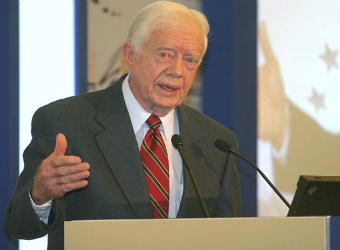The US-based Carter Centre issued a statement on 6 January on Egypt’s upcoming constitutional referendum, urging Egypt’s interim government to create an inclusive and meaningful environment in which the proposed constitution can be discussed.
The statement stressed the need to ease restrictions and crackdowns on the Muslim Brotherhood and opposition activists in order to create a stable environment for Egypt’s transition to democracy.
The centre, led by former US president Jimmy Carter, expressed concern about the “polarized environment and the narrowed political space” and the “lack of an inclusive process for drafting and publicly debating the draft constitution.”
The statement reinforced the centre’s support for Egypt’s transition to democracy, but warns that present political conditions are likely to hinder any progress. “The centre recommends that Egyptian authorities reverse the crackdown on the Muslim Brotherhood and other opposition activists,” and to “rescind the recently enacted protest law that restricts public gathering”.
The statement also urged the interim government to lift restrictions on media outlets sympathetic to the Muslim Brotherhood, while urging security forces and citizens to “refrain from acts of violence, incitement and intimidation”, which have plagued and polarised Egypt since the 3 July ousting of Mohamed Morsi.
Moreover, the centre recommended that the interim government educate citizens on the “parameters of the referendum, including what results or thresholds will constitute approval as well as what will happen if the referendum fails”.
If the referendum passes, the statement added, it is crucial that authorities take “genuine steps… to initiate and sustain inclusive and meaningful dialogue on additional constitutional reforms and a broadly accepted framework for future elections”.
Although the centre is not sending monitors to oversee the referendum, it organized an “expert mission” to analyse the ongoing legal and political context of the transition.
The Carter Center oversaw the recent 2011-2012 parliamentary elections as well as the 2012 presidential election. It called Egypt’s recent attempts at formulating and implementing a meaningful constitution “deeply flawed”, adding that the rushed attempts served “as a source of political conflict and polarization rather than a means to achieve consensus”.
The referendum, which will be monitored by 47 national and international NGOs, is slated to take place on 14 and 15 January. An estimated 54 million Egyptians are eligible to vote.



